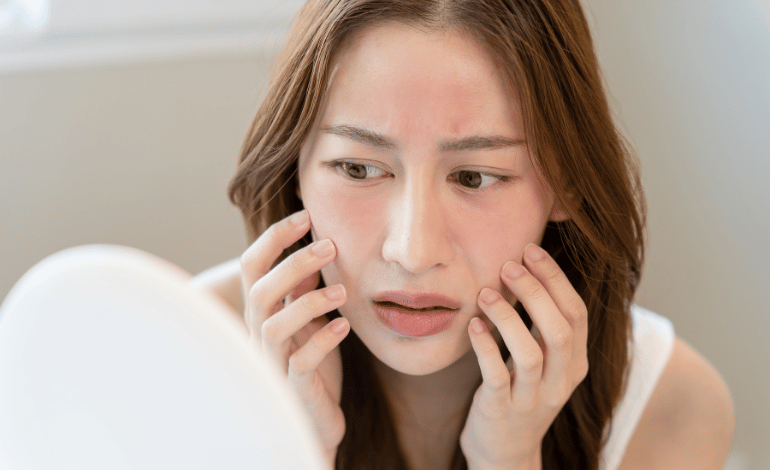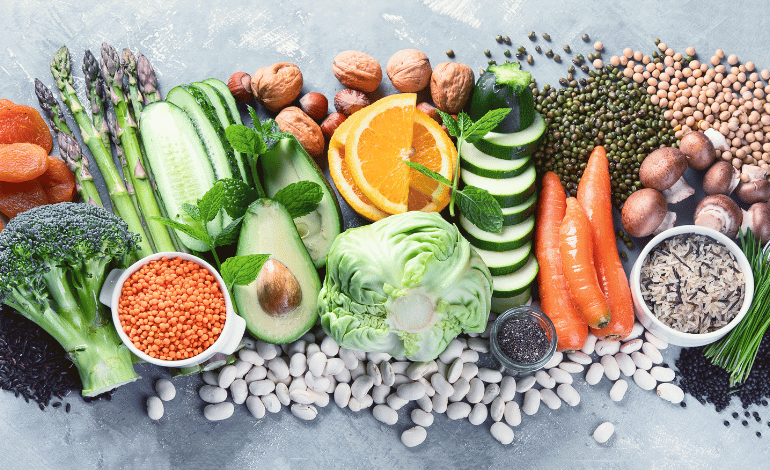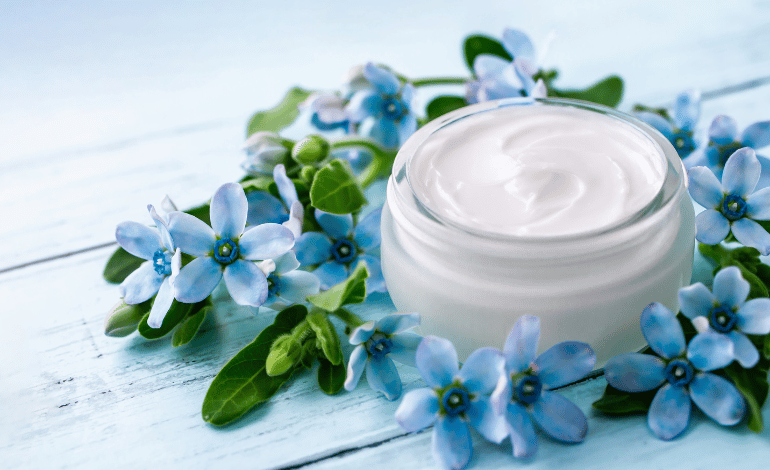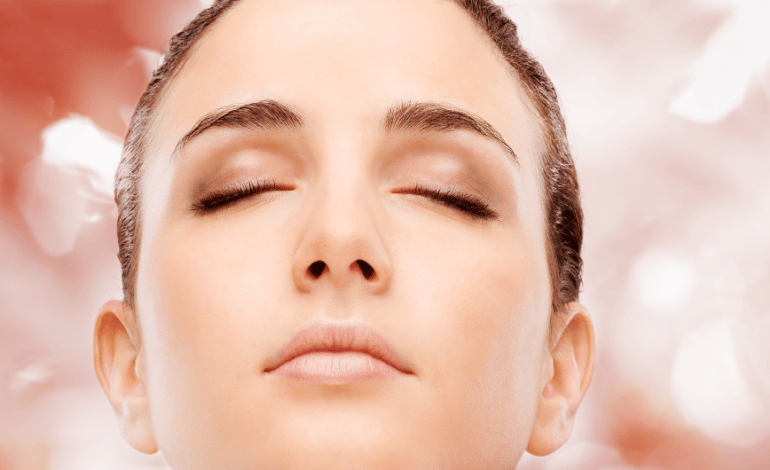Oily Skin: How to Manage and Treat It at Home

Oily Skin: How to Manage and Treat It at Home: Do you struggle with oily skin? Don’t worry, you’re not alone! Many people deal with excess oil production, which can lead to shiny skin, acne, and other skin concerns. Oily skin is when your skin produces too much oil, also known as sebum. While some oil is necessary to keep your skin hydrated and healthy, too much can cause shiny skin, clogged pores, and breakouts.
Oily skin can be caused by a variety of factors, including genetics, hormones, diet, skin care products, and climate. But the good news is that there are plenty of ways to manage oily skin, such as cleansing regularly, using lightweight, oil-free products, and avoiding harsh skincare ingredients. With a little bit of effort, you can keep your skin looking and feeling healthy and radiant!
What are some causes of Oily Skin?
Oily skin is caused by a variety of factors, some common causes of oily skin include:
Genetics: Oily skin can run in families, as some people are naturally predisposed to produce more sebum, the oily substance that lubricates and protects the skin.
Hormonal changes: Hormonal changes, such as those that occur during puberty, menstruation, pregnancy, and menopause, can cause an increase in sebum production.
Diet: A diet that is high in processed foods, sugar, and unhealthy fats can contribute to oily skin.
Skincare products: Some skincare products, particularly those that are oil-based or contain heavy moisturizers, can contribute to oily skin.
Climate: Hot and humid climates can cause an increase in sebum production, as can exposure to air conditioning and central heating.
Over-washing: Over-washing your face or using harsh cleansers can strip your skin of its natural oils, causing it to produce more oil to compensate.
Daily Skincare Routine for Oily Skin
If you have oily skin, it’s important to follow a daily skincare routine that helps regulate oil production and keeps your skin clean and healthy. Here’s a step-by-step guide to a daily routine for oily skin:
Step 1: Cleansing
Cleansing is the first step in any skincare routine. Choose a gentle, oil-free cleanser that’s specifically formulated for oily skin. Wet your face with warm water, apply the cleanser, and gently massage it onto your skin using circular motions. Rinse thoroughly with warm water and pat dry with a clean towel.
Step 2: Toning
Toning helps remove any residual dirt or oil that the cleanser may have missed. Look for a toner that contains ingredients like witch hazel or salicylic acid to help regulate oil production. Apply the toner to a cotton pad and swipe it over your face, focusing on your T-zone (forehead, nose, and chin).
Step 3: Serum
Applying a serum to your face can help to hydrate and nourish your skin, as well as reduce oil production. Choose a lightweight serum that is formulated for oily skin, and apply it to your face and neck, gently massaging it in. Serums typically contain a high concentration of active ingredients that can help to address specific skin concerns, such as acne or hyperpigmentation.
Step 4: Moisturizing
Even oily skin needs hydration. Look for a lightweight, oil-free moisturizer that won’t clog your pores. Apply the moisturizer to your face and neck, being careful not to apply too much.
Step 5: Sun protection
Protect your skin from the damaging effects of the sun by applying a broad-spectrum sunscreen with an SPF of at least 30. Look for a sunscreen that’s oil-free and non-comedogenic, so it won’t clog your pores.
Step 6: Makeup (optional)
If you wear makeup, choose products that are oil-free and non-comedogenic. Look for products that contain ingredients like salicylic acid or benzoyl peroxide, which can help regulate oil production and prevent breakouts.
Step 7: Nighttime routine
Before going to bed, repeat steps 1-4 to remove any dirt or oil that may have accumulated on your skin during the day. It’s also a good idea to use a gentle exfoliating product once or twice a week to help remove dead skin cells and prevent clogged pores.
In addition, consider using a night cream or serum that’s specifically formulated for oily skin. These products often contain ingredients like glycolic acid or niacinamide, which can help control oil production and reduce the appearance of pores.
Overall, it’s important to remember that everyone’s skin is unique, so it may take some trial and error to find the right products and routine for your oily skin. Be patient, consistent, and listen to your skin’s needs to achieve a healthy, balanced complexion.
Home Remedies to Treat Oily Skin
Oily skin and acne are challenging to manage. Still, home remedies often reduce symptoms without the use of prescription drugs or expensive skin care regimens. Here are some home remedies that may help treat oily skin:
Apple cider vinegar: Apple cider vinegar has astringent properties and can help reduce oil production. Mix equal parts apple cider vinegar and water and apply to your face with a cotton ball. Rinse off with water after 10-15 minutes.
Lemon juice: Lemon juice contains citric acid, which can help reduce oil production and exfoliate the skin. Apply fresh lemon juice to your face with a cotton ball, leave on for 10-15 minutes, and rinse off with water.
Egg whites: Egg whites can help tighten pores and reduce oil production. Beat an egg white until it’s frothy, apply to your face with a brush or cotton ball, and leave on for 10-15 minutes. Rinse off with water.
Oatmeal: Oatmeal can help absorb excess oil and exfoliate the skin. Mix 1 tablespoon of oatmeal with enough water to form a paste. Apply to your face and gently massage in circular motions. Rinse off with water.
Honey: Honey has antibacterial and anti-inflammatory properties and can help soothe and moisturize oily skin. Apply a thin layer of honey to your face, leave on for 10-15 minutes, and rinse off with water.
It’s important to note that while these home remedies may be helpful, they should be used in conjunction with a good skincare routine and healthy habits. It’s also important to patch test any new ingredient on a small area of skin to ensure you don’t have an allergic reaction or irritation.
Food to add in your Diet for Oily Skin
If you have oily skin, you may want to consider adding certain foods to your diet that can help improve your skin’s condition. Here are some examples:
Omega-3 Fatty Acids: Foods that are rich in omega-3 fatty acids, such as fatty fish (salmon, mackerel, and sardines), flaxseeds, and walnuts, can help reduce inflammation and regulate oil production in the skin.
Antioxidant-Rich Fruits and Vegetables: Fruits and vegetables that are high in antioxidants, such as blueberries, strawberries, spinach, kale, and broccoli, can help protect your skin from damage caused by free radicals and promote healthy skin.
Probiotic-Rich Foods: Foods that contain probiotics, such as yogurt, kefir, kimchi, and sauerkraut, can help improve gut health, which in turn can improve skin health.
Whole Grains: Whole grains, such as brown rice, quinoa, and oats, are rich in fiber, which can help regulate blood sugar levels and reduce inflammation in the body.
Water: Drinking plenty of water can help flush out toxins from your body and keep your skin hydrated, which can reduce oil production.
Diet can play a role in improving skin health, but it’s not a substitute for proper skincare and medical treatment if necessary.
Foods to avoid for Oily Skin
If you have oily skin, there are some foods you may want to avoid or limit in your diet, as they can contribute to excess oil production and skin problems. Here are some examples:
High-Glycemic-Index Foods: Foods that are high in sugar and refined carbohydrates, such as white bread, pasta, and sugary snacks, can cause a spike in blood sugar levels, which can lead to increased oil production and inflammation in the skin.
Dairy Products: Dairy products, such as milk and cheese, can contain hormones that can stimulate oil production in the skin and contribute to acne.
Fried and Greasy Foods: Fried and greasy foods, such as fast food, potato chips, and fried chicken, can increase oil production in the skin and clog pores, leading to acne and other skin problems.
Processed and Packaged Foods: Processed and packaged foods, such as chips, crackers, and cookies, often contain preservatives, additives, and unhealthy fats, which can contribute to inflammation in the body and skin problems.
Alcohol and Caffeine: Excessive consumption of alcohol and caffeine can dehydrate the body and the skin, leading to increased oil production and other skin problems.
It’s important to remember that everyone’s skin is different, and what works for one person may not work for another. If you notice that certain foods or drinks are causing problems with your skin, it may be helpful to limit or avoid them in your diet. Additionally, maintaining a healthy diet, staying hydrated, and practicing good skincare habits can all help improve the health of your skin.
Conclusion
In conclusion, oily skin is a common skin type that can be caused by various factors, including genetics, hormonal changes, and environmental factors. While it can be frustrating to deal with, there are several steps you can take to manage it and promote healthy skin.
A good skincare routine is essential in managing oily skin. This includes using gentle, non-comedogenic products, avoiding harsh scrubs or exfoliants, and protecting your skin from UV damage with sunscreen. Additionally, a balanced diet that is rich in fruits, vegetables, whole grains, and lean proteins can help regulate oil production and reduce inflammation in the skin.
It’s important to avoid habits that can worsen oily skin, such as over-washing your face or using harsh products. Instead, focus on keeping your skin clean and moisturized without stripping away its natural oils.
If you’re struggling to manage oily skin on your own, consider consulting with a dermatologist. They can provide personalized recommendations and treatments to help you achieve healthy, balanced skin.
Overall, while oily skin can be challenging to deal with, it’s important to remember that it’s a common skin type that can be effectively managed with proper skincare and healthy habits. With the right approach, you can achieve healthy, radiant skin.
FAQS
Q1. What causes oily skin?
Ans. Oily skin can be caused by a variety of factors, including genetics, hormonal changes, and environmental factors such as humidity and heat.
Q2. How can I manage oily skin?
Ans. Managing oily skin involves establishing a good skincare routine, avoiding harsh products that can strip away natural oils, and using non-comedogenic products. Additionally, eating a balanced diet and avoiding habits such as smoking and excessive alcohol consumption can also help.
Q3. Can oily skin lead to acne?
Ans. Oily skin can contribute to the development of acne, as excess oil production can clog pores and lead to inflammation.
Q4. Are there any specific ingredients I should look for in skincare products for oily skin?
Ans. Ingredients such as salicylic acid, benzoyl peroxide, and retinoids can be helpful in managing oily skin. Additionally, products that contain clay or charcoal can help absorb excess oil.
Q5. Should I skip moisturizer if I have oily skin?
Ans. No, even oily skin needs moisturizer to stay healthy and balanced. Look for lightweight, oil-free moisturizers that won’t clog pores.
Q6. Can oily skin be treated with home remedies?
Ans. Yes, there are several home remedies that can help manage oily skin, including apple cider vinegar, lemon juice, egg whites, oatmeal, and honey. However, it’s important to patch test any new ingredient on a small area of skin first and to remember that home remedies should be used in conjunction with a good skincare routine and healthy habits.








